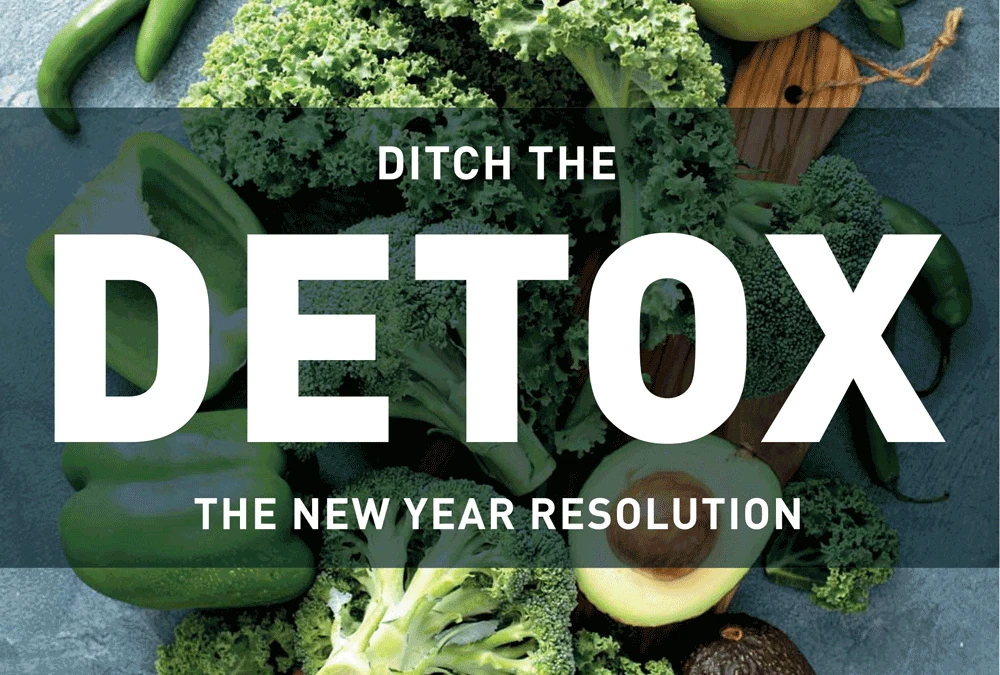New Years resolutions always seem to include a need to cleanse and undertake a fresh approach to health and worklife balance.
With seasonal celebrations potentially leaving us feeling jaded and over indulged, it’s hardly surprising the word ‘detox’ suddenly sounds attractive.
WHAT IS DETOX?
Detoxification implies an action that eliminates a build up of excessive (and by implication) harmful toxins in the human body. Popular detox outcomes to removing these toxins or ‘poisons’ from your body include reducing unwanted fat, clearing your complexion, restoring energy and even improving your immune system.
THE RISKS
However, undertaking popularised detox practices such as fasts and crash diets which are extremely low calorie and primarily liquid, carry risks such as vitamin deficiencies, muscle breakdown and blood sugar issues including low energy, irritability and headaches to name a few. Depriving the body of vital vitamins and minerals can weaken the body’s ability to fight infections and inflammation, plus upset essential potassium and sodium levels.
“Restricting solid foods to survive on only low-calorie beverages for days at a time is supposed to cleanse the body but we don’t need an extreme diet to cleanse our insides, as humans already have a built-in detoxification system — the liver, kidneys, lungs and skin” says Dr Robert Przemioslo, Consultant Gastroenterologist and Hepatologist, MD, FRCP, Spire Hospital Bristol.
He adds,
“These concepts are not based on medical fact. A detox diet is complex, often costly and not judged against any standard other than a perception of improvement due to a placebo effect. On the other hand, a change to a healthy diet with some exercise has been shown in multiple clinical trials to reduce the development of gut conditions such as irritable bowel syndrome, diverticular disease, bowel cancer, fatty liver as well as heart disease, diabetes and strokes”.
THE FICTION: DRINK AS MUCH WATER AS POSSIBLE
The current popularity of detox diets which recommend drinking many litres of water a day and, drinking even when not thirsty, could cause problems if taken to extremes. The claim is that drinking more water than usual can do everything from improving your skin tone to “flushing out” toxins from your body. “However, the amount of water actually needed in a day varies from person to person, and depends on other factors such as climate, and exercise”, says Lorraine Perretta. She adds: “Too much water could “overwhelm” the body’s natural mechanisms for keeping levels in balance. The body already has a brilliant system for doing this, but if water levels in the blood rise too high, it just can’t cope.”
THE DANGERS OF DETOX DIETS
Many detox diets are nutritionally insufficient. Detox diets are not recommended for teenagers, pregnant women, or people with health conditions because of the danger from not getting enough calories and proteins. Poor nutrition during detox can lead to muscle loss, fatigue and irritability. Detox diets do not result in long-term weight loss and most people rapidly regain any lost weight once the diet is over. There is no real evidence that a detox diet is any better at getting rid of toxins than your body’s own natural defense mechanisms.

ONE
Ditch the detox and encourage No-Tox instead. January is a great time to make a change to lifestyle and this should be holistic, rather than just focusing on food intake.
TWO
Reduce toxins by minimising the daily intake of processed foods, sugar, caffeinated drinks and alcohol.
THREE
Give up smoking. Some people also find it useful to restrict the intake of wheat and dairy.
FOUR
Eat regular meals with plenty of fresh vegetables and moderate fruit as these contain important key antioxidant nutrients to support the natural detoxification processes. Include raw seeds, nuts and oily fish for beneficial omega fats.
A detox diet is complex, often costly and not judged against any standard other than a perception of improvement due to a placebo effect.
Dr Robert Przemioslo, Consultant Gastroenterologist and Hepatologist.
FIVE
Keep hydrated. Drink plenty of fluids such as herbal teas and water. Avoid consuming large quantities of fruit juice due to the hidden sugar content! Juicing removes the health benefiting fibre leaving a drink that may spike blood sugar levels. It’s much better to make a smoothie using a blender as this retains the vegetable and fruit fibre as well as key nutrients.
SIX
Take a good multivitamin and mineral to assist the body detoxifying, such as Skin Vitality 2 or Pro-Vitality Formula.
SEVEN
Keep moving. NHS guidelines recommend that a healthy 19-64 year old should aim for at least 150 minutes of moderate aerobic activity such as cycling or brisk walking every week, as well as strength exercises on two or more days a week that work all the major muscles. Sweating is a natural way of eliminating toxins from the body.
EIGHT
Think holistically. Eliminate the need for short term fixes. Be kind to yourself by addressing areas of stress in your life and consider meditation, mindfulness or yoga to help restore calm.
NINE
Sleep is an essential ingredient to your no-tox regime. Do not consume caffeine, sugar -rich foods or alcohol for minimum 3 hours before retiring for the night.
TEN
Introduce a digital detox. Switch your phone off at the end of each day. Do not allow mobile phones, tablets or laptops in the bedroom as exposure to the blue light our devices emit promote brain activity and wakefulness.
A no-tox diet fundamentally encourages regular meals daily, a balanced mix of protein with fruit and vegetables, good fat intake as well as minimising or eliminating excess carbohydrates and sugar.
Dr Robert Przemioslo, Consultant Gastroenterologist and Hepatologist.
